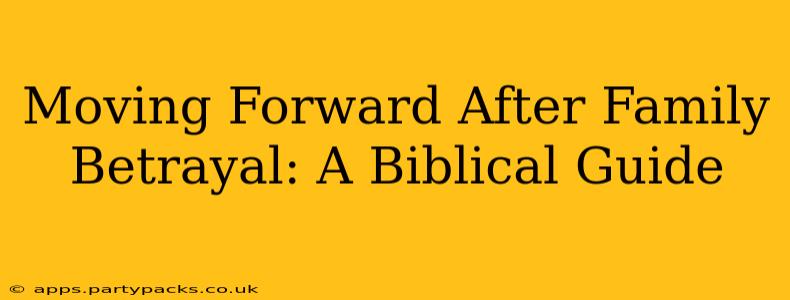Family betrayal. The very phrase evokes a deep sense of pain, confusion, and anger. It shatters trust, leaving wounds that can take years to heal. When the betrayal comes from within the family unit—a place where love and support should be paramount—the impact is even more devastating. But even in the face of such profound hurt, healing and moving forward are possible, particularly when guided by the principles found within the Bible. This guide provides practical steps and biblical insights to help navigate this difficult journey.
What Does the Bible Say About Betrayal?
The Bible doesn't shy away from the harsh reality of betrayal. From the betrayal of Joseph by his brothers (Genesis 37) to the betrayal of Jesus by Judas (Matthew 26), scripture offers numerous examples and insights into dealing with such painful experiences. These stories, while vastly different in their contexts, offer invaluable lessons in forgiveness, resilience, and finding strength in faith. The recurring theme is one of redemption and restoration, even amidst seemingly irreparable damage.
How Can I Forgive a Family Member Who Betrayed Me?
Forgiveness isn't about condoning the actions of the betrayer; it's about releasing the bitterness and resentment that poison your heart and soul. It's a process, not a single event. The Bible emphasizes the importance of forgiveness repeatedly, urging us to forgive as we have been forgiven by God (Matthew 6:14-15). This doesn't mean immediately restoring the relationship; it means choosing to release the anger and pain, allowing yourself to heal. Seeking guidance from a trusted pastor, counselor, or mentor can be invaluable in this process. Consider journaling your feelings, praying for your family member, and focusing on your own spiritual growth.
What if I Don't Feel Like Forgiving?
It's completely understandable to struggle with forgiveness, especially when the betrayal is profound and the pain is raw. Forgiveness is a journey, not a destination. It's okay to grieve the loss of trust and the hurt caused. Allow yourself the time and space to process your emotions. Don't pressure yourself to forgive instantly. Instead, focus on steps you can take to heal emotionally and spiritually. Remember that God's grace is sufficient, even when our own strength feels lacking (2 Corinthians 12:9). Lean on your faith, seek support, and allow God to work in your heart over time.
How Do I Protect Myself From Future Betrayal?
While you can't completely prevent future betrayals, you can take steps to protect yourself emotionally and spiritually. Setting healthy boundaries is crucial. This means defining what you will and will not tolerate in relationships. Communicating these boundaries clearly and consistently is essential. Surrounding yourself with a supportive community of friends and family who cherish you can provide the emotional strength needed to navigate difficult situations. Remember that choosing to forgive doesn't mean you have to forget or reconcile immediately, it simply means releasing yourself from the burden of unforgiveness.
How Do I Rebuild Trust After Family Betrayal?
Rebuilding trust after a betrayal is a long and arduous process, and it may not always be possible. If reconciliation is a goal, it requires honesty, transparency, and a willingness from all parties involved to work through the issues that caused the betrayal. This often necessitates professional help from a counselor or therapist who can guide the family through the necessary steps to repair the broken relationship. It's vital to approach the process slowly and cautiously, ensuring that trust is rebuilt incrementally and only when actions consistently reflect remorse and commitment to change.
Can I Still Have a Relationship with My Family Member After the Betrayal?
The decision of whether or not to maintain a relationship with a family member after betrayal is deeply personal. There's no right or wrong answer. It depends on the severity of the betrayal, the remorse shown by the offending party, and your own capacity to heal and forgive. Prioritizing your own well-being is paramount. If maintaining the relationship compromises your mental or emotional health, it's okay to prioritize distance and self-preservation. Remember, healing from betrayal is a process, and you have the right to choose what's best for your well-being.
Moving forward after family betrayal is a challenging but achievable journey. By leaning on faith, seeking support, and embracing the principles of forgiveness and self-care, you can find healing and move towards a future filled with peace and hope. Remember, you are not alone, and God's love and grace are always available.

